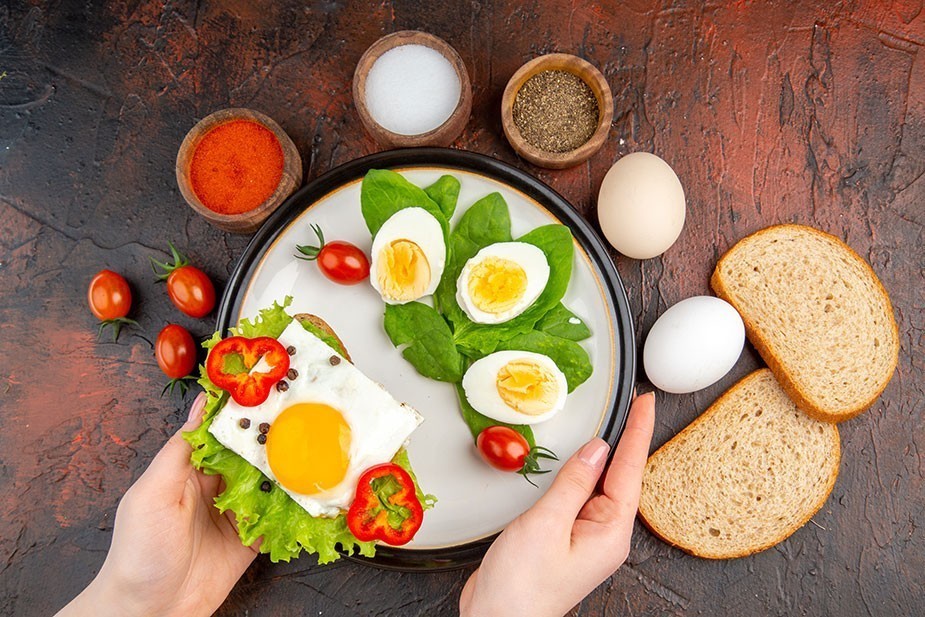The Egg Diet has become increasingly popular, thanks to its simplicity and the numerous variations available on the internet. It gained significant attention when some celebrities credited their rapid weight loss to this particular diet.
Some individuals have even claimed to lose up to 30 kilograms in just three months, while actor Adrian Brody reportedly lost 15 kilograms preparing for his role in the acclaimed film, “The Pianist.” Brody followed a version of the diet that included eggs for breakfast, a small piece of grilled chicken for lunch, and a piece of fish with steamed vegetables for dinner.
The Egg Diet: Basics and Tips
Although there are dozens of variations of the Egg Diet online, we will focus on the most popular one, which incorporates other food items besides eggs. This version of the diet is similar to the Atkins Diet, with a focus on significantly reducing carbohydrate intake. It consists of two or more eggs for breakfast, along with low-carb vegetables or lean meat, and a grapefruit.
Lunch and dinner can include another serving of eggs or small portions of lean meat (chicken and fish). Salads and low-carb vegetables are allowed, while the fruit is limited to one or two pieces per day. Other carbohydrates such as bread, pasta, and potatoes are strictly prohibited.
Another version of the diet, called the “Egg and Grapefruit Diet,” involves eating half a grapefruit with each meal. The rest of the diet plan is very similar to the version described above.
There is also a variation called “The Egg, Banana, and Sausage Diet” which differs as it requires including both sausage and banana as mandatory parts of the meal.
The most extreme version of the diet consists of consuming only hard-boiled eggs and drinking water. This version is not recommended due to its potential negative effects on health and overall well-being.
Additional Tips for Success
- Make sure to have breakfast every day, ideally within half an hour of waking up.
- Eat approximately every three hours and avoid breaks between meals longer than five hours.
- For snacks, opt for an apple or an orange.
- Avoid eating just before bedtime; have your last meal at least three hours before sleeping.
- Stay hydrated throughout the day by drinking at least eight glasses of water.
Recommended Foods and Sample Meal Plan
Recommended foods for the Egg Diet include eggs, lean meats, low-carb vegetables, unsweetened herbal teas, and water.
Sample egg diet plan:
Day 1
- Breakfast: 2 boiled eggs and 1/2 grapefruit
- Lunch: Skinless baked chicken and green salad
- Dinner: 2-egg omelet with spinach and tomatoes
Day 2
- Breakfast: 2 boiled eggs and tomatoes
- Lunch: 2-egg omelet with broccoli
- Dinner: 2 boiled eggs, canned tuna, and green salad
Day 3:
- Breakfast: Hard-boiled eggs with cherry tomatoes and a small apple
- Lunch: Tuna salad stuffed in bell pepper halves
- Dinner: Grilled shrimp with sautéed green beans and a side salad
Day 4:
- Breakfast: Greek yogurt with chopped nuts and a drizzle of honey
- Lunch: Egg salad on whole-grain toast with a side of carrot sticks
- Dinner: Baked chicken with steamed broccoli and a side salad
Day 5:
- Breakfast: Poached eggs over sautéed kale and mushrooms
- Lunch: Cobb salad with hard-boiled eggs, grilled chicken, and avocado
- Dinner: Pork tenderloin with roasted cauliflower and a side salad
Day 6:
- Breakfast: Egg muffins with mixed vegetables
- Lunch: Chicken Caesar salad (no croutons) with a side of cherry tomatoes
- Dinner: Baked tilapia with zucchini noodles and a side salad
Day 7:
- Breakfast: Cottage cheese with sliced almonds and a small orange
- Lunch: Turkey, avocado, and egg wrap with a side of snap peas
- Dinner: Lemon herb chicken with roasted bell peppers and a side salad
Keeping the Egg Diet Interesting
As the Egg Diet can become monotonous, it is essential to diversify your meals and make them more interesting. Experiment with various egg preparation methods, such as boiled, scrambled, poached, or fried without additional fat. Season your eggs with your favorite spices, such as basil, oregano, rosemary, turmeric, spice blends, or simply salt and pepper.
Egg Cooking Tips and Tricks
For the best-tasting scrambled eggs, cook them slowly over medium heat. Stirring occasionally will help ensure even cooking and a creamy texture.
To save time, cook a week’s worth of eggs in advance and store them in the refrigerator. Hard-boiled eggs can be kept for up to one week, while scrambled or poached eggs can be stored for up to four days in an airtight container.
For perfectly cooked boiled eggs, follow one of the two methods provided in the original text. These methods will help you achieve the desired consistency, whether you prefer soft or hard-boiled eggs.
To prevent eggs from cracking during cooking, pierce a small hole in the wider end of the eggshell using a pin or needle. This small hole allows air to escape during the cooking process, reducing the pressure inside the egg and minimizing the risk of cracking.
Additionally, placing the eggs in the pot before heating the water can help to prevent cracking as the eggs will gradually heat up with the water, reducing the risk of a sudden temperature change causing a crack.
Exercise Recommendations
While on the egg diet, it’s essential to incorporate regular exercise into your routine to optimize weight loss and overall health. Aim for at least 150 minutes of moderate aerobic activity or 75 minutes of vigorous aerobic activity per week, spread out over at least three days a week. Additionally, include strength training exercises that target all major muscle groups on two or more days a week.
Some suitable exercises for this diet include walking, jogging, swimming, cycling, and dancing for cardio, as well as bodyweight exercises, resistance bands, or weightlifting for strength training. Remember to always consult with your doctor before starting any new exercise program, especially if you have any pre-existing health conditions.
Pros and Cons of the Egg Diet
Pros:
- High protein intake: The Egg Diet is rich in protein, which can help build muscle and keep you feeling fuller for longer periods.
- Quick weight loss: The high protein and low carbohydrate nature of the Egg Diet may result in rapid weight loss, especially in the short term.
- Simple and easy to follow: The Egg Diet mainly focuses on eggs as the primary ingredient, making it relatively easy to plan and prepare meals.
Cons:
- Limited variety: The Egg Diet’s emphasis on eggs can lead to a lack of variety in food choices, potentially causing boredom and difficulty in sticking to the diet long-term.
- Nutrient deficiencies: Due to its restrictive nature, the Egg Diet may not provide all the necessary nutrients for a balanced diet, which could lead to deficiencies and potential health issues.
- Unsustainable: The rapid weight loss experienced on the Egg Diet may be difficult to maintain once the diet is stopped, increasing the risk of weight regain.
The Importance of a Balanced Diet
While the egg diet can result in short-term weight loss, it’s crucial to understand that a balanced, nutritious diet is vital for long-term health and weight maintenance. The egg diet is restrictive and may not provide all the essential nutrients your body needs to function optimally.
After completing the diet, consider transitioning to a more sustainable, well-rounded eating plan that includes a variety of fruits, vegetables, lean proteins, whole grains, and healthy fats.
Egg diet FAQ
- Does the 14-day egg diet work?
The 14-day egg diet may lead to weight loss due to its high protein and low carbohydrate nature. However, results may vary depending on individual factors such as age, metabolism, and activity level. It is important to note that the weight loss may be temporary, and the diet could potentially lead to nutrient deficiencies due to its restrictive nature. - What is the 7-day egg diet?
This is a shorter version of the egg diet, lasting for a week. It focuses on consuming eggs as the primary source of protein, along with other low-carb foods like lean meats, vegetables, and healthy fats. The 7-day egg diet aims to promote weight loss by reducing carbohydrate intake and increasing protein consumption. - What is the diet egg 3 days?
This is an even shorter version of the egg diet, designed as a quick weight-loss solution. It involves consuming eggs and other low-carb, high-protein foods for three days. While this diet may result in short-term weight loss, it is not a long-term solution and may not provide all the necessary nutrients for a balanced diet. - What is the 5-day egg diet?
The 5-day egg diet is another variation of this diet, lasting for five days. It emphasizes the consumption of eggs, lean protein, vegetables, and healthy fats while minimizing carbohydrate intake. This diet may lead to short-term weight loss, but it is essential to keep in mind that the results may not be sustainable and that the restrictive nature of the diet could lead to nutrient deficiencies.
In Conclusion
The egg diet can be an effective short-term solution for weight loss, but it’s essential to approach it with caution and awareness of its limitations. By incorporating regular exercise and transitioning to a balanced diet after completing the egg plan, you can maintain your weight loss results and enjoy better overall health.
Always consult with a healthcare professional or registered dietitian before embarking on any restrictive diet to ensure it’s safe and appropriate for your individual needs.
. . .
“Real food doesn’t have ingredients, real food is ingredients.” – Jamie Oliver





